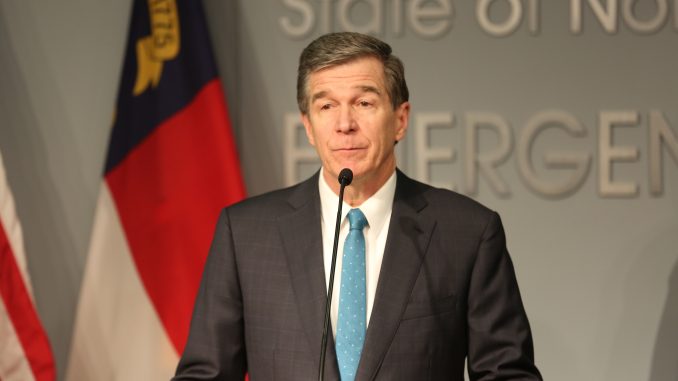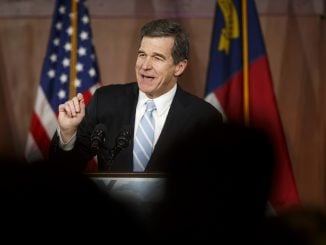
RALEIGH — Emails from Council of State members have resurfaced after news outlet WBTV received a response to a records request about a concurrence vote pertaining to Governor Roy Cooper’s executive order restricting bars and restaurants.
On March 17, the governor issued an order that had two parts. One part expanded unemployment insurance and the second part closed bars and restricted restaurants to take-out and delivery services only. Later that afternoon Lt. Gov. Dan Forest issued a statement questioning the validity of the restaurant ban, citing lack of concurrence with the Council of State.
“After the press release, and shortly before a scheduled press conference, I, along with other Council of State members, was asked to concur with the governor’s decision with no discussion,” said Forest. “The governor held his press conference and made the announcement even after a majority of the Council of State voted not to concur with the Governor. Thus, he does not have the authority to issue this part of his executive order.”
“It’s one thing to disagree, it’s another to create a chaotic situation in the middle of a pandemic. The governor is taking action to protect the health and safety of North Carolinians and does not need concurrence. The governor and the Secretary of DHHS have the authority to do this under state public health and emergency powers law,” Cooper spokeswoman Sadie Weiner said in response to Forest via a press release at 4:43 p.m.
Included with Forest’s statement was a link to a series of emails between Council of State (COS) members and Cooper’s Deputy Assistant General Counsel Will Polk. Those emails show that Cooper sought concurrence but did not receive it for the restaurant and bar restrictions.
The first email in the chain was en email sent by Polk at 11:23 a.m. on March 27 that asked the COS to standby to receive a concurrence email “within the hour” on the governor’s new executive order, which in addition to altering unemployment rules, included a second provision for shutting down bars and dine-in restaurant services.
Polk’s followup email ended up being sent well over the hour promised, arriving in COS inboxes at 12:41 p.m. with a deadline for responding at 1:15 p.m. – a mere thirty minutes later.
At 12:45 p.m., Forest responded to the group and asked “In #2 are you asking for concurrence in something the governor has already announced?” Forest was referring to the fact that at 10:25 a.m Cooper had already tweeted information about the restaurant and bar restrictions.
— Governor Roy Cooper (@NC_Governor) March 17, 2020
In addition to publicizing the upcoming order, the governor had also scheduled a press conference for 2 p.m. that day – just an hour and 15 minutes after Polk emailed asking for concurrence.
At 1:34 p.m., Forest responded again to Polk’s email asking “what restrictions exist on gubernatorial power under 166A-19.30(b)(5)?” The state statute reference by Forest deals in detail with the emergency powers the governor has “with the concurrence of the Council of State.”
Section (b)(5) reads, “To perform and exercise such other functions, powers, and duties as are necessary to promote and secure the safety and protection of the civilian population.” Arguably, section (b)(2) also applies:
“To establish a system of economic controls over all resources, materials, and services to include food, clothing, shelter, fuel, rents, and wages, including the administration and enforcement of any rationing, price freezing, or similar federal order or regulation.”
At 2:09 p.m., Treasurer Dale Folwell responded to the group asking that the orders be split and referenced that the governor had “already publicized item #2,” which referred to the restaurant restrictions. Folwell also said, “Lastly I would appreciate you or anyone connected with you NOT politicizing any heartfelt and genuine suggestions that any Council of State member offers.”
At some point during the email exchanges, Labor Commissioner Cherie Berry’s chief of staff responded that “On Item #2, Commissioner Berry would like to have been afforded the courtesy of commenting on this item before it was made public.”
Insurance Commissioner Mike Causey emailed at around At 2:36 p.m., stating “I do not concur on #2” which was the restaurant provision.
Nearly two hours after Polk sent the concurrence email, at around 2:38 p.m., Folwell sent an email saying, “the governor himself needs to address compliance of #1 with the Council of State. ” The treasurer then asked to “amend item #2 to potentially UNIFY the N.C. Council of State against COVID-19.”
Of the 10 COS members, Cooper only received concurrence from the three Democrats on the council: Attorney General Josh Stein, State Auditor Beth Wood and Secretary of State Elaine Marshall. The remaining seven members unanimously did not concur on item #2.
Metadata on Governor Cooper’s Executive Order 118 showed that it was edited for the final time around 5:30 p.m. and sometime thereafter it was uploaded to the governor’s website and made public.
The lack of transparency by the Cooper administration over the course of his tenure has been an ongoing issue for the governor including items like access to Cooper’s travel records, leaving the state without notifying state officials or media, dealing surrounding the $58 million Atlantic Coast pipeline fund, and long-standing unfilled records requests.
The COVID-19 outbreak has added to Cooper’s transparency problems. The legislature has had to stipulate greater data transparency from the N.C. Dept. of Health and Human Services (NCDHHS) in order to be granted state funds for COVID-19 going forward. The Cooper administration also had to be pressured to release details about the governor’s phased plan to reopen the state for business.
In the last week, around a dozen news outlets including the Associated Press and New York Times have filed suit against Cooper and NCDHHS over denial of COVID-19 records. The suit says the Cooper administration, including NCDHHS, are “‘knowingly and intentionally’ violating records law.”



